Defiance: the console MMO that might just work
A day's play on Trion's ambitious TV tie-in.
The nicest thing you can say about Defiance is that it achieves one of the most elusive and difficult challenges in the games business and makes it look relatively easy. Here it is, that fabled beast, a creature so rare and endangered it's almost mythical: the server-based, massively multiplayer console game.
"Nobody has really cracked that nut," agrees executive producer Nathan Richardsson. The Icelander was previously a key executive at Eve Online studio CCP, and beloved of fans as the shirtless, beer-swilling rabble-rouser of CCP's Fanfest events: a self-described "technoviking". Today he's in more restrained mood, representing his new employer Trion Worlds to the press who've come to London to sample a day's play of Defiance on rows of test PS3s.
It was Defiance that attracted Richardsson away from his tiny homeland, he tells me - specifically, the challenge of realising a multi-platform MMO. Defiance will launch on PC and Xbox 360 as well as PS3 in April next year. Only a scant few games like Final Fantasy 11 and DC Universe Online have preceded it, with the walled garden of Xbox Live proving particularly hard for massively multiplayer gaming to breach. If that weren't ambitious enough, Defiance has a fourth platform of sorts: a SyFy TV series set in the same world, with a plotline that will supposedly reflect events in the game world, and vice versa.
Understandably, that's the aspect of the game that's drawn the most attention to date. Defiance takes place on a future Earth, terraformed almost beyond recognition and partly colonised by alien races who live alongside humans. Various factions compete for control as well as resisting the bug-like mutants who arrive on the planet in "Arkfall" events.
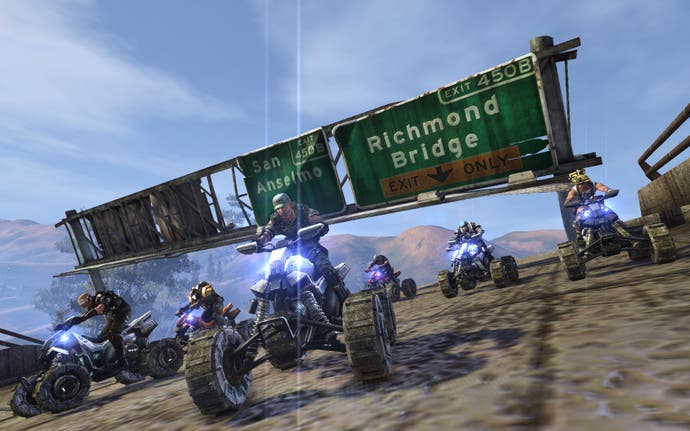
The game takes place near the ruins of San Francisco while the TV series happens in St Louis, giving them enough geographical separation that they won't tread on each other's plot toes. But while the first season of the show is airing - it starts a couple of weeks after the game goes live - crossover events timed to coincide exactly with certain episodes will affect the game world. After the season has run its course, the game takes the narrative reins, with players' actions potentially influencing the plotting and scripting of season two.
It's a hell of a high concept, but it's also fraught with pitfalls - and a lot depends on the quality of the show (see 'Second screen', below). Fortunately, Defiance has another trick up its sleeve.
Based on my time with the game, it's one of the more natural and free-flowing action MMOs to date, and it feels very much at home and unforced on a console. To all intents and purposes, it plays like your everyday third-person shooter and open-world game. It just so happens that the open world is persistent, connected and teeming with other players.
Think massively multiplayer Borderlands with a Guild Wars 2 influence. Then get a little bit less excited, because Defiance is a more pedestrian game than that implies. It's not pretty - Trion's artwork is just as generic and plain as it was in the studio's previous fantasy game, Rift. It's currently bogged down with bugs and sluggish performance and the shooter gameplay is basic, if solid. But it works. And it's surprisingly easy to lose hours to.
"Rather than trying to push the square peg of an MMORPG into the round hole of a console's disc tray, Trion has taken a console action game and plugged it into the internet"
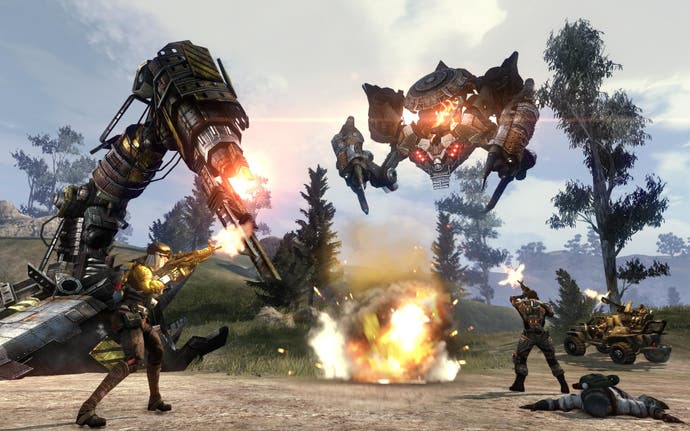
"We have taken a certain amount of MMO elements, but a much stronger influence from third-person shooters and open worlds, because that lends itself better to the console," Richardsson explains. "That's why I wouldn't really call it an MMO." Maybe he's trying to dodge a label that, after so many high-profile disappointments, is getting less fashionable by the day - but he also has a point. Rather than trying to push the square peg of an EverQuest-style MMORPG into the round hole of a console's disc tray, Trion has taken what's recognisably a console action game and plugged it into the internet.
Case in point: the levelling and character classes. Defiance has them, of course, but they're not at the heart of the game design and multiplayer dynamics the way they are in so many MMOs. It's the Borderlands model instead, with the four classes each having a single standout skill (or "EGO power") but being able to use and excel in any weapon or combat style. The skills provide flavours rather than roles - stealth, decoy, frenzy, movement speed - and if you want to heal your comrades, you just equip a healing gun.
Levelling, meanwhile, is more a matter of customising your character and unlocking new perks and options than it is about the traditional slog up the slopes of Stats Mountain. The focus is wisely on looting ever-better weapons - they don't quite have Borderlands' toothsome variety, but they're tasty enough to always want another helping - and improving them with attachments while you advance your skill with each gun type. You can equip shields and a range of grenades, too, and switch between five loadouts to suit your mood.
The remarkably smooth flow of play is where Guild Wars 2's open approach to multiplayer missions comes in - although to be fair to Trion, it's based on the dynamic event technology the company rolled out in Rift, which pre-dates ArenaNet's game.
Take a mission, conveniently summon your quad bike out of thin air and dash across the lumpen landscape to your objective marker - so far, so Just Cause or GTA. When you get there, you might be alone or there might be others already playing the same mission, which cycles through multiple phases. You don't need to worry about sharing the mission in a menu or waiting for it to reset - just get stuck in, because all progress counts. Some story missions might have you playing alone alongside an AI character instead, but you won't see the join.
The main story mission content is decent and definitely more fun in numbers, but the solo-friendly side-missions are tiny and rather forgettable. There are some passable mini-game distractions dotted around - 'Horde'-style wave survival games, quad bike races - with leaderboard support. The best fun of all are the Arkfalls, truly dynamic large-scale events which spawn on the gigantic map at random. As they cycle through their phases, they attract an ever-growing crowd of players surging from one objective marker to the next to fight giant bugs; the sense of momentum is intoxicating, and certainly something console gamers have been missing out on.
Using a few taps of the d-pad, you can also quickly join a number of other multiplayer game types. Pursuits are four-player co-op maps terminating in boss monsters - essentially Defiance's dungeons - and the one I played was great fun. There's also a pretty standard team deathmatch mode on dedicated maps, and Shadow War, a game of domination taking place in the open world that can scale up to 50 players on each side.
It's safe stuff - perhaps deliberately so. That's partly why Defiance doesn't make a particularly strong first impression. Its setting struggles to assert a personality or any characters you might care about, while its looks and combat are run-of-the-mill. But it's fun to play in most of its modes, the drip-feed of new weapons is persistently tempting, and the sense of connectedness, of belonging to a world of players - most powerfully conveyed in those Arkfall events - is a truly refreshing novelty in this context.
"You'll see large content drops every two months, which will include both a free and a paid component." - Nathan Richardsson, executive producer
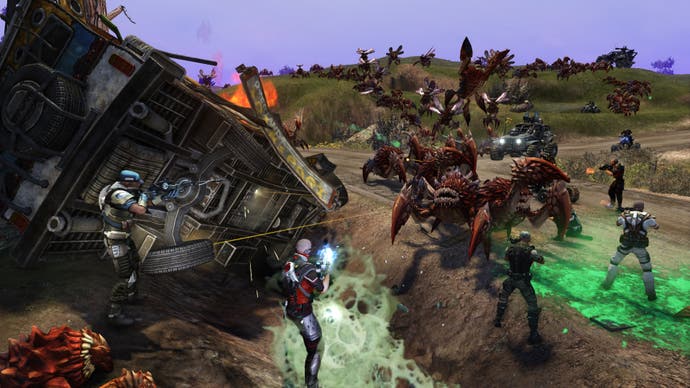
Inevitably, the question of how we're going to pay for those servers rears its ugly head. I spot a few XP boosters and the like for sale in a menu and quiz Richardsson about it. "It's still financially a bit of an operation to run a massively multiplayer game," he reminds me, before explaining that Defiance will use a "hybrid business model". (He also quite fairly points out that almost all business models are hybrids, these days.)
"I can't give you a lot of details yet, we're just about to finalise them actually... Defiance is a retail game, there is a box," he says. "But at the same we're taking a strong cue from MMOs, where we have a really aggressive update schedule. You'll see large content drops every two months for example, which will include both a free and a paid component. There's also smaller updates which will be roughly bi-weekly." It sounds like a reasonable halfway house between the DLC add-ons of console games and the steady stream of tweaks and novelties expected by MMO subscribers.
Defiance is far from a guaranteed crossover hit; too much hangs on the success of the TV series and the questionable appeal of its fiction, while it's currently in a rough-and-ready state that suggests Trion's testers and fixers have a very busy few months ahead (the release date being set in stone, for obvious reasons). But there's substance and smart decision-making on show here, as well as a certain amount of luck and good timing. If Defiance doesn't prove to be the game to popularise massively multiplayer gaming on consoles, the game that will won't be far behind it.
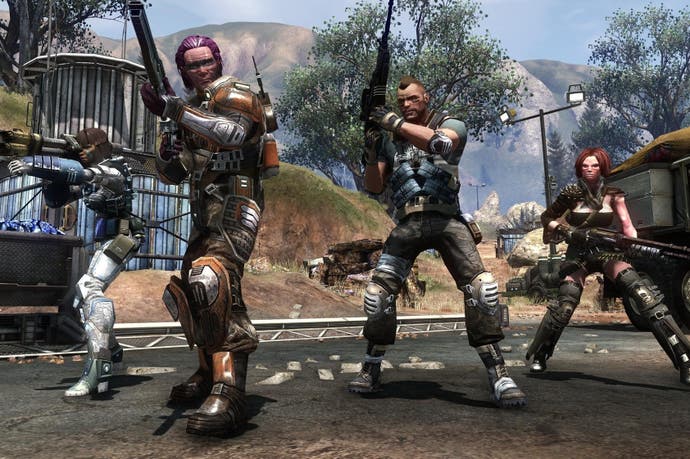


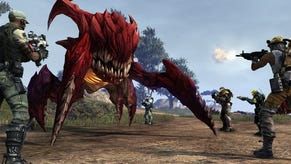

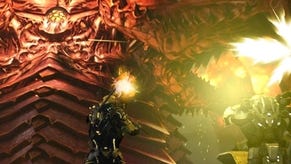



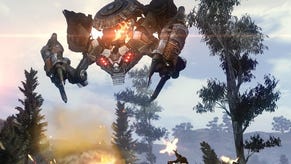



.png?width=291&height=164&fit=crop&quality=80&format=jpg&auto=webp)



